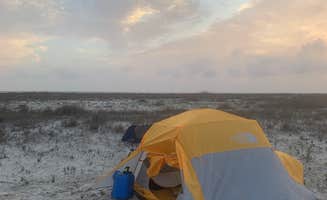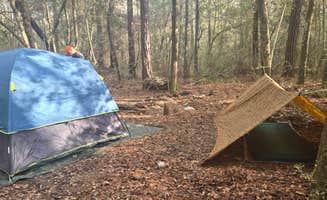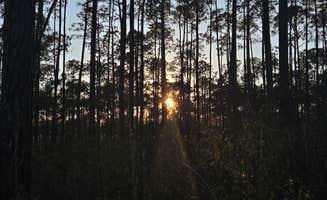Dispersed camping opportunities around Ocean Springs, Mississippi include primitive sites accessible by both land and water. The Mississippi coastal region features several barrier islands and inland wilderness areas where campers can find free camping with minimal amenities. These locations typically require self-sufficiency and adherence to Leave No Trace principles. Weather conditions along the Gulf Coast vary seasonally, with high humidity in summer months and milder temperatures during fall and winter.
What to do
Paddling adventures: The short kayak trip to Deer Island Dispersed Camping provides excellent wildlife viewing opportunities. "The journey from the launch point to the island was just a short and enjoyable few minutes. The owner of the company provided us with valuable insights about the wildlife and ensured we didn't miss anything noteworthy," notes David M.
Explore unmarked trails: Navigate the backcountry paths within Leaf Wilderness Area. Campsites are visible from the main access routes. "You just drive and see very clear campsites along the main road," explains Ethan B., who recommends being aware of your surroundings as recreational activities occur throughout this public land.
Bird watching: Morning hours offer prime bird watching opportunities in coastal areas. Many species inhabit the barrier islands and marshlands. Bring binoculars and identification guides to enhance observation of both resident and migratory birds that frequent the Gulf Coast region.
What campers like
Accessible seclusion: Despite being visible from Biloxi, Deer Island provides a sense of isolation. "It's less than a half-mile off the coast, but far enough away to be left alone. Great paddling, quiet camping, lots of birds," shares Sami H. This proximity makes it suitable for paddlers seeking solitude without venturing too far from shore.
Primitive experience: Free camping near Ocean Springs, Mississippi appeals to those wanting to disconnect from developed campgrounds. The absence of facilities means fewer crowds and greater immersion in natural surroundings at both water and land-based sites.
Budget-friendly options: No-cost dispersed camping areas allow for extended stays without campground fees. Many sites permit longer stays than commercial campgrounds, though regulations on maximum duration still apply. Public land camping regulations typically allow 14-day stays within a 30-day period.
What you should know
Accessibility challenges: Finding unmarked entrances to dispersed camping areas can be difficult, particularly in low light or inclement weather. "My GPS said turn left, I looked and there was an old, overgrown, wagon trail. Next to a private residence. WITH NO SIGN. I was afraid I was trespassing," reports Debbie S. about her experience trying to locate Leaf Wilderness Area.
Boat-only access: Some sites require water transportation. "I wish I would've known this was only accessible via boat, which in hindsight was obvious from the title," Stephen G. mentions about Deer Island Dispersed Camping. Kayaks, canoes, or small motorboats are necessary to reach island camping areas.
Limited communication: Cell service varies significantly throughout dispersed camping areas. Coastal locations may have better reception due to proximity to populated areas, while inland wilderness regions often have limited or no service. Consider bringing alternative communication devices for emergency situations.
Tips for camping with families
Safety planning: When taking children to boat-accessible sites, ensure everyone wears properly fitted life jackets. The crossing to offshore islands, though short, requires preparation for changing weather and water conditions. Pack additional safety equipment like whistles, flashlights, and first aid supplies.
Weekend awareness: Family groups should consider timing when planning trips to popular dispersed areas. Weekdays typically offer quieter experiences with fewer visitors. "I've been told it gets crowded with parties and boats on weekends, but I didn't see any of that," notes Sami H. about weekday camping on Deer Island.
Environmental education: Teach children about coastal and forest ecosystems through hands-on exploration. Bring field guides to identify local plants and animals. The contrast between maritime forests, beaches, and inland wilderness areas provides diverse learning opportunities about different ecological zones.
Tips from RVers
Alternative options: Most dispersed camping near Ocean Springs lacks facilities for larger recreational vehicles. RV campers should consider established campgrounds in the region that provide appropriate hookups and space for larger vehicles.
Supply planning: No water, electric, or sewer connections exist at dispersed sites. RVers attempting to access suitable dispersed areas must be fully self-contained with adequate fresh water reserves and waste storage capacity. Plan for 2-3 gallons of water per person per day, plus additional water for cleaning and cooking.
Road conditions: Many access roads to dispersed camping areas are unpaved and may present challenges for vehicles with low clearance. Seasonal weather conditions can significantly impact road quality. Heavy rain often creates muddy or impassable conditions on dirt roads leading to wilderness camping areas.




